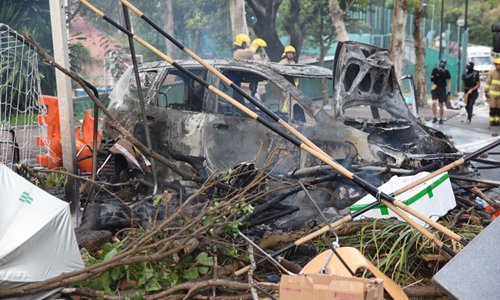HOME >> CHINA
Fake news targeting HK police risk split society further
By Li Qingqing Source:Global Times Published: 2019/11/14 23:38:40
HKSAR govt can prosecute rumormongers based on existing laws: expert

The China University of Hong Kong (CUHK) turned into a war zone on November 12, dominated by a huge fire and smoke, road barricades and fierce confrontation between rioters and police.Photo: Web
As the situation in Hong Kong continues to escalate after 23 weeks of violence, fake news and rumors smearing the police have threatened to split the society as well as the relationship between the city and the mainland, Chinese experts noted, calling for legal measures to punish rumormongers.
After the Hong Kong police's operations at the Chinese University of Hong Kong (CUHK) on Tuesday, rioters said the police "escalated their violence" at campuses. The rumor has been spreading quickly on Twitter, and many netizens on Twitter followed the rioters by criticizing the police.
They also said that the police operation was aimed at controlling the CUHK's data center, where "99 percent of data in Hong Kong" pass through, media reported.
However, according to the police press conference on Wednesday, the action was intended to protect drivers on the Tolo Highway near the university as the rioters were throwing debris from a bridge.
Rioters threw Molotov cocktails and debris at the police during our operation, the police said.
Rioters started rumors and fake news to create division and manipulate public opinion, Tian Feilong, an associate professor at Beihang University in Beijing and a Hong Kong studies expert, told the Global Times on Thursday.
"Another important purpose is to affect the elections, instigate hatred of pro-establishment forces and eventually seize power in Hong Kong," Tian noted.
Echoing Tian, Zhi Zhenfeng, a legal expert at the Beijing-based Chinese Academy of Social Sciences, said that "by creating rumors and confusing right from wrong, the rioters are whitewashing their acts and justifying their terror-like violence, trying to instigate the situation in Hong Kong and win more support."
But experts stressed the rioters can only rope in a few people by spreading rumors, and as the rioters' damage to Hong Kong society becomes more serious, the truth will reveal itself.
Massive violence resurfaced last week in Hong Kong after the death of Chow Tsz-lok, an undergraduate from the Hong Kong University of Science and Technology.
Chow died on November 8 from brain injuries after falling from a parking garage, which rioters claimed was because he was being chased by the police. They even suggested that the police pushed him off the garage.
Rioters, in the name of "mourning" and "avenging" Chow, continued to vandalize facilities at the university since that day and launched attacks at police officers. Some of them even tried to snatch a gun from the police, forcing the police to pull out the gun and shoot.
Similar rumors spread after the dead body of a girl was found floating in the sea on September 22, and was identified by local media as the missing 15-year-old girl surnamed Chan, who had joined demonstrations several times before her death.
Some media and rioters fabricated reports claiming that police may have beaten Chan to death or forced her to kill herself.
Hong Kong police denied the rumor on October 11, saying they never arrested the girl. They also denied other rumors, including one which claimed that mainland police have joined the Hong Kong police force and the police pretended to be demonstrators destroying MTR stations.
Previous rumors also circulated on social media said a Hong Kong teenager was gang-raped at a Hong Kong police station on September 27 and had to have an abortion. The rumor again triggered a confrontation with police.
However, according to the police, the girl was already seven to eight weeks pregnant on November 7.
"Rioters can spread rumors quickly because they are aggressive and try to find every fault in the police," Li Xiaobing, an expert on Hong Kong, Macao and Taiwan studies, from Nankai University in Tianjin, told the Global Times on Thursday.
"Thus, the rioters will seize every opportunity to twist or exaggerate the truth, to try to smear the police," Li said.
Experts called for effective measures to curb rumors and fake news to stop the situation from escalating in Asia's once finest city.
Tian said that starting rumors is a crime, and if there is clear evidence showing rioters are fabricating and spreading rumors, the Hong Kong government can prosecute them based on existing laws.
"The Hong Kong government should further strengthen regulation and tracking of online rumors to curb the damage of rumors on the Hong Kong police and the rule of law."
Posted in: SOCIETY,HK/MACAO/TAIWAN